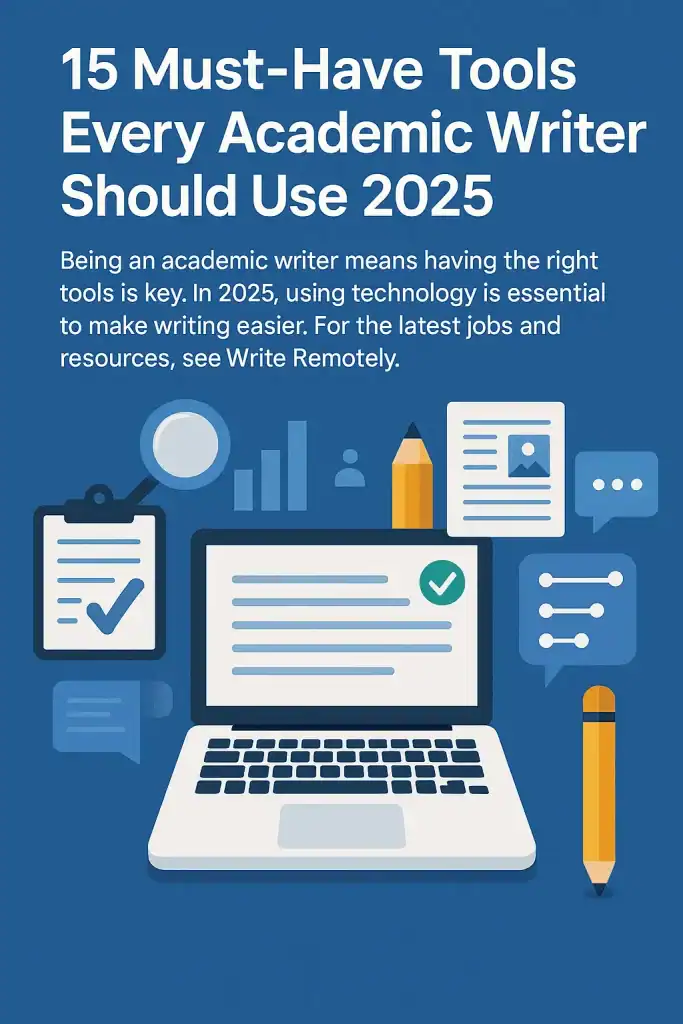Being an academic writer means having the right tools is key. In 2025, using technology is essential to make writing easier. For the latest jobs and resources, see Write Remotely.
I’ll show you the top tools to change your academic writing game. These tools help with research, organization, writing, and teamwork. They make your work better and faster.
Key Takeaways
- Discover the best tools to improve academic writing productivity.
- Learn to streamline your research and organization process.
- Explore writing enhancement tools to improve your work quality.
- Understand the benefits of collaboration tools for academic writers.
- Stay updated with the latest resources by visiting relevant platforms.
The Evolving Landscape of Academic Writing
Digital tools are changing how writers do research, organize, and work together. Now, writers have many research tools for writers and writing software for academics to help them. It’s important to choose the right tools to boost productivity and quality.
For the latest jobs and resources, see “Write Remotely”. The goal is to use tools that make writing easier, better organized, and collaborative. This way, writers can do their best work quickly.
Research and Organization Tools
The right tools can make academic writing easier and faster. Tools like Zotero, Notion, and Evernote help manage references and organize research. They also help capture notes efficiently.
1. Zotero: The Ultimate Reference Management System
Zotero is a strong bibliography manager for collecting and organizing sources. It lets you create a library of references, annotate PDFs, and make citations in different styles. It works well with word processors and syncs across devices, making it key for writers.
For the latest jobs and resources, see Write Remotely.
2. Notion: All-in-One Workspace for Research Organization
Notion is a workspace for organizing research, combining notes, tasks, and databases. It’s flexible, fitting your needs for any project. Its team features make it great for working with others.
3. Evernote: Capture and Organize Research Notes
Evernote is great for organizing research notes. It has tagging and searching to keep you organized. You can save web pages, articles, and ideas in notebooks. Evernote syncs across devices, so your notes are always with you.
Using these tools can greatly improve your writing efficiency. Whether you’re using Zotero for references, Notion for organization, or Evernote for notes, these tools streamline your work.
15 Must-Have Tools Every Academic Writer Should Use in 2025
Academic writing in 2025 has many tools to help. These tools make writing easier by managing references and organizing research. For the latest jobs and resources, see Write Remotely.
Mendeley: Reference Manager with Collaboration Features
Mendeley is a top tool for managing references and working with others. It lets you organize your research library, annotate PDFs, and cite sources well. It also has features for teamwork, making projects more efficient and less stressful.
- Organize and annotate research papers
- Generate citations and bibliographies
- Collaborate with others in real-time
Scrivener: Specialized Writing Software for Long-Form Projects
Scrivener is great for big projects like dissertations and books. It helps you break down your manuscript into sections, rearrange content easily, and stay focused on writing. It’s perfect for those big, detailed projects.
- Project management for long-form writing
- Customizable interface for improved focus
- Advanced research organization capabilities
EndNote: Professional Bibliography Management
EndNote is a top choice for managing bibliographies. It works well with word processors, making citations easy. It lets you create a personal library of references, format citations in many styles, and manage bibliographies easily. It’s great for those who need to follow specific citation styles.
- Integration with major word processing software
- Support for thousands of citation styles
- Advanced search and organization features
Using these tools can really improve your writing. They help with managing references, organizing your work, and formatting citations. These tools are essential for any academic writer.
Writing Enhancement and Editing Tools
When I started writing, I learned how important the right tools are. Writing and editing are key steps in making your work stand out. The right tools can really boost your writing’s quality.
To get better at writing, you need tools that spot mistakes and make your text clearer. I’ll talk about three great tools: Grammarly Pro, ProWritingAid, and Hemingway Editor. They can all help you write better.
Grammarly Premium: Advanced Grammar and Style Checker
Grammarly Pro is a top-notch tool for checking grammar and style. It gives you tips to improve your writing. With it, your writing will be clear and easy to follow.
Grammarly Pro is great at catching small mistakes that others might miss. This is super helpful for students who need to write without errors.
ProWritingAid: Deep Analysis for Academic Writing
ProWritingAid is a tool that digs deep into your writing. It points out areas to improve, like sentence structure and word choice. It helps you understand your writing better and make it stronger.
ProWritingAid’s reports let you see how you’re improving over time. This helps you get better at writing and find new ways to express your ideas.
Hemingway Editor: Clarity and Readability Improvement
The Hemingway Editor is simple but powerful. It shows you complex sentences and words that make your writing difficult to read. It helps you write in a clear and easy way.
For the latest writing jobs and resources, check out Write Remotely. Using these tools can make your writing better and more engaging.
Plagiarism Prevention and Citation Tools
With more digital content, tools to find plagiarism and manage citations are key. As an academic writer, keeping your work original and properly cited is vital.
Two important tools are Turnitin and Cite This For Me. They help keep your work honest by finding plagiarism and making correct citations.
Turnitin: Industry-Standard Plagiarism Detection
Turnitin is a top plagiarism checker for academic work. It checks against a huge database of journals, publications, and web content. This makes it a strong tool for originality.
- Checks against a vast database of academic and online content
- Provides detailed reports on possible plagiarism
- Helps in keeping academic integrity
Cite This For Me: Quick and Accurate Citations
Cite This For Me is a citation manager that makes creating citations easy. It supports many citation styles, like APA, MLA, and Chicago. This makes it useful for different academic needs.
- Creates citations quickly and accurately
- Supports multiple citation styles
- Helps in organizing references efficiently
For more on academic writing and remote work, check out Write Remotely.
Productivity and Focus Tools
Keeping focus while writing is a big challenge. The right tools can help a lot. We often get distracted, but there are tools to keep us on track.
Freedom: Distraction Blocking for Deep Work
Freedom blocks distracting websites and apps on all your devices. It lets you focus on your writing. This tool helps you work better and write more quality content.
You can choose which sites and apps to block and schedule your focus time. It also syncs across all your devices. This helps you stay focused and meet your writing goals.
Forest: Gamified Focus Sessions
Forest uses games to stay focused. You grow a virtual forest as you work. If you get distracted, your forest dies.
This game makes writing more fun and rewarding. It also tracks your productivity. This helps you see how you can improve your writing habits.
For more tips on writing productivity and finding new jobs, check out Write Remotely.
Collaboration and Feedback Tools
Academic writing is now more collaborative than ever. The right tools are essential for improving quality and efficiency in group projects.
Collaboration and feedback are key in academic writing. Many tools have emerged to help researchers collaborate smoothly.
Overleaf: A Collaborative LaTeX Editor
Overleaf is a top choice for collaborative LaTeX editing. It lets many users edit a document at the same time. It has track changes, commenting, and version control features.
- Real-time collaboration
- Integrated version control
- Easy commenting and track changes
Google Docs: Real-Time Collaboration and Feedback
Google Docs is great for collaboration and feedback. It lets many people edit a document at once. It has commenting and suggested edits to help everyone work together better.
For the latest remote writing jobs and resources, check out Write Remotely. It’s a great place for academic writers to find collaborations or new projects.
Conclusion: Transforming Your Academic Writing Workflow
Adding the right tools to your writing can really boost your work. The 15 essential tools for writers in 2025, as we’ve talked about, bring many benefits. They help with research, organizing, writing, and working together.
Using these tools can make your writing smoother, better, and honest. They’re great for any project, big or small, and for working with others. These tools keep you on track and help you meet your goals.
For more tips on writing from home and finding new job opportunities, check out Write Remotely. Using these tools and resources, you can change how you write for school. This can lead to more success in your studies.
FAQ
What are the essential tools for academic writer to improve their productivity?
To boost productivity, writers can use Zotero, Notion, and Evernote for research and organization. Mendeley, Scrivener, and EndNote are great for managing references and writing. Tools like Grammarly Premium, ProWritingAid, and Hemingway Editor can also improve your writing quality.
How can I ensure originality in my academic work?
Use plagiarism detection tools like Turnitin to check for originality. Also, cite sources correctly with tools like Cite This For Me.
What tools can help me stay focused during my writing sessions?
Freedom and Forest can block distracting websites and apps. They also make productivity fun by gamifying it.
Can I collaborate with others using these tools?
Yes, many tools offer collaboration features. Mendeley, Overleaf, and Google Docs let you work with others in real-time.
Are there any tools that can help me with grammar and style checking?
Yes, Grammarly Premium and ProWritingAid offer advanced grammar and style checks. They suggest ways to improve your writing.
How can I manage my references and citations effectively?
Tools like Zotero, Mendeley, and EndNote help manage references and citations. They make it easy to organize and cite sources.
What are the benefits of using a citation generator?
Citation generators like Cite This For Me create accurate citations fast. They save time and reduce the chance of errors.


 Owner of Write Remotely. Connecting businesses with talented writers and empowering remote work.
Owner of Write Remotely. Connecting businesses with talented writers and empowering remote work. 

